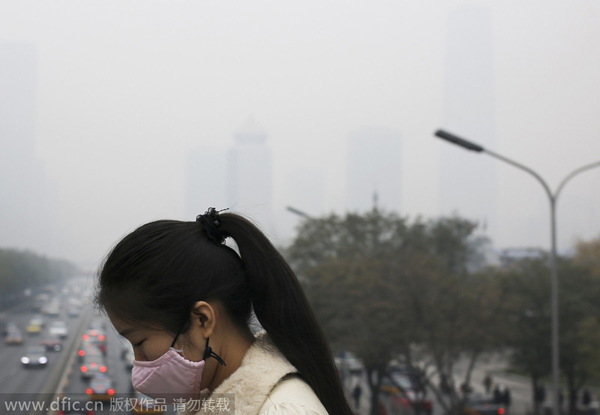Thick smog to choke N China cities
(Xinhua/chinadaily.com.cn) Updated: 2014-11-20 15:00
 |
|
A woman wearing a mask to protect herself from pollutants walks on a pedestrian overhead bridge during a hazy day in Beijing Wednesday, Nov. 19, 2014. [Photo/IC] |
BEIJING -- The National Meteorological Center (NMC) on Thursday warned that severe smog will hit the cities of Beijing and Tianjin as well as parts of Hebei and Henan provinces from Thursday night.
In Beijing, the air has been noticeably hazy for several days. The Beijing Meteorological Bureau on Wednesday morning issued a code yellow alert to warn residents of smog in several districts via its weibo account.
It is the first smog to hit the capital since the APEC Economic Leaders' Week ended on November 12.
The alert warned that Daxing, Tongzhou and Fangshan districts would be shrouded by smog from Wednesday to Thursday.
On Thursday, the central and southern part of the city was particularly hard hit by severe air pollution, according to the NMC.
During the APEC meetings, Beijing had been free of smog as emission-heavy production drew to a halt and half of cars across the capital were banned to lessen pollution.
Peng Yingdeng, an environmental protection expert, believes improving the air quality in Beijing is a long-term project. He said: "It's impossible to expect Beijing's air will change fundamentally through some short-term temporary regulations and measures."
According to Peng, the blue sky during the APEC shows that temporary measures can work to decrease the air pollution, which could be referenced as the method for long-term air pollution prevention.
The NMC's monitoring data also observed that more areas in north China -- including the northeastern and northwestern regions, as well as some areas south of the Yangtze River -- had reported bad air quality.
It also forecast that from Thursday night a new cold front in north China will start moving southward, which could gradually disperse the smog.
At the current time people with respiratory issues are advised to stay in doors or wear protective masks.
- Govt encourages people to work 4.5 days a week
- Action to be taken as HIV cases among students rise
- Debate grows over reproductive rights
- Country's first bishop ordained in 3 years
- China builds Tibetan Buddhism academy in Chengdu
- Authorities require reporting of HIV infections at schools
- Typhoon Soudelor kills 14 in East China
- Police crack down on overseas gambling site
- Debate over death penalty for child traffickers goes on
- Beijing to tighten mail security for war anniversary







